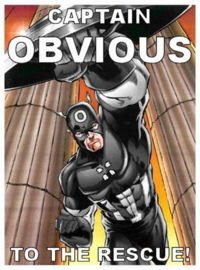This Job’s Easy But I Make It Hard
Note: Today's Post is from a guest contributor and one of my favorite Agile-ists, Dan Greenberg. I am fortunate to have been his coach when he first started his Agile journey - and even more fortunate to be his friend.
As a Scrum Master, I have good days and bad.
As a Scrum Master, I have good days and bad.
There are the days when I feel a limitless surge of energy, when I see my team joking around with one another while getting real work accomplished and having difficult conversations in a productive manner. The backlog is the holy grail, the sprint is sacred, the team is empowered, stakeholders are delighted, and there is a palpable aura of levity on the development floor.
Then, there is the reverse side of the coin when everything feels tense, when the stiff waterfall corporate energy overtakes the room, when every action I take seems to exacerbate the frustration, and I question my abilities, my fit for this position, and my life choices to this point (okay, I’m being dramatic, but trust me it can happen).
What I’m interested in investigating is what causes one type of day over another and what can I do to have more good days than bad? The theory i have (as well as the hope I cling to for my future career) is that it is not circumstances, people, or even the company or client I am working for that separates my serenity from my insanity - but rather it is me. Who I am, the expectations I have, the “me” that walks into that office can have a profound impact on team morale, customer engagement, product quality, and overall satisfaction of everyone I encounter.
My first introduction to Agile came while working in a place that was about as toxic as it gets. Fear permeated everything we did, resistance to change was rampant, every proposal was fought and argued over, transparency was nil, safety was nonexistent, and countless hours (and yes years) were wasted with non-value-add work. I apologize to those reading this who work there but I assure you this is not intended as a personal attack and I was not shy about voicing my opinions while I was there so this should not come as a surprise.
Yet, even in that environment, I experienced days of complete bliss. The situation I was in hadn’t changed, the people, culture, work environment, all of it was static my entire time there. So what was it? I’d like to relate an anecdote from my time there. It’s lesson is so powerful I’ll never forget it.
I was facilitating a sprint planning session and everything was all wrong. The product owner was bullying the team, no one understood any of the user stories and no one felt empowered enough to speak up. User stories were being written on the fly in vague shorthand. The team was being told their capacity. I was losing my mind. And I wasn’t hiding it well. It was at that moment that my agile coach, who was observing all of this sent me a text: “Leave.”
I got up and walked out of the room, without any explanation to the people in there. My coach followed. He said I needed to fix me. He took me outside down the street to get some ice cream. We talked, I vented, and my attitude completely changed. I felt better. We returned to the sprint planning session after having been gone for 45 minutes or so. None of what I described above had changed at all. But I had. The me that walked back into that room was not the one who left that room. And I swear something was different. The mood got lighter, the team was relaxed. Everything from a “pure scrum” standpoint was still all screwed up but I no longer cared. I actually felt good leaving that meeting.
See, I can read all the Scrum, Agile, coaching, and self-help books in the world. I can spend nights and weekends planning the most creative retros and tracking all the different metrics that textbooks say will improve my team. But what happened on that afternoon at that ice cream shop cannot be read in a textbook nor quantified by a metric. And harnessing whatever power it was that I harnessed that day may well be the most beneficial thing anyone on any team can do.
So I am going to challenge myself: Which me will I bring to work tomorrow? What can I do to ensure that the right me shows up? As a wise spiritual friend of mine often says, “the most important thing is remembering the most important thing.”



Comments
Post a Comment
Thank you for your feedback!